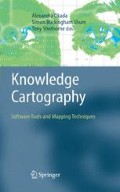Abstract
This paper presents the Nestor Web Cartographer software, its features, its user interface, the constructivist approach to mapping Internet information that guided its design and the experience gained after 10 years of use in academic contexts. We focus on five selected features such as the hybrid representation system, some original visual widgets, the groupware section, and we discuss their role within a constructivist approach. We argue that they favour the collaborative and incremental construction of formalized knowledge. A case study in Lyon School of Management (EM LYON) is discussed with more details.
References
Armitage, U., Wilson, S. (2004), Navigation and ownership for learning in electronic texts. An experimental study, EJEL, Vol 2.
Brown, C., Cole, M. (2000), Cultural historical activity theory and the expansion of opportunities for learning after school, http://lchc.ucsd.edu/People/Localz/MCole/browncole.html.
Bruner, J. (1968), Processes of cognitive growth: Infancy. Worcester, MA: Clark University Press.
Bush, V. (1945), As we may think, The Atlantic Monthly, July.
Conklin, J. (1987), Hypertext: an introduction and survey, Computer, September, 17–41.
Eklund, J., Sawers, J., Zeiliger, R. (1999), NESTOR navigator: a tool for the collaborative construction of knowledge through constructive navigation. In: R. Debreceny and A. Ellis (eds.). Proceedings of Ausweb99, The Fifth Australian World Wide Web Conference. Southern Cross University Press, Lismore, pp. 396–408.
Engestrom, Y., Miettinen, R., Punamaki, R.-L. (Eds). (1999), Perspectives on activity theory. Cambridge: Cambridge University Press.
Esnault, L., Ponti, M., Zeiliger, R. (2004), Constructing knowledge as a system of relations, In: Proceedings of the Scandinavian Baltic Sea Conference: Motivation, Learning and Knowledge Building in the 21st Century, Stockholm, June 18–21, Sweeden.
Freire, P. (1991), The importance of the act of reading. In C. Mitchell and K. Weiler (Eds.), Rewriting literacy: Culture and the discourse of the other. New York: Bergin & Garvey.
Hammond, N., Allinson, L. (1989), Extending hypertext for learning: an investigation of access and guidance tools. In: A. Sutcliffe and L. Macaulay (eds.), People and Computers V. Cambridge: Cambridge University Press.
Jackson, M., Poole, M., Kuhn, T. (2001), The social construction of technology in studies of the workplace. In: Lievrouw, L.; Livingstone, S., (Eds.), Handbook of new media. London: Sage.
Jonassen, D.H., Rohrer-Murphy, L. (1999), Activity theory as a framework for designing constructivst learning environments, ETR&D, Vol 47, N°1, 61–79.
Kaptelinin, V., Kuutti, K., Bannon, L.J. (1995), Activity Theory: Basic Concepts and Applications, Lecture Notes in Computer Science, Vol 1015, Berlin Heidelberg New York: Springer.
Okada, A.L.P., Zeiliger, R. (2003), The building of knowledge through virtual maps in collaborative learning environments, In: Proceedings of the World Conféence on Educational Multimedia, Hypermedia & Communistaions, Hawaii. EDMEDIA, pp. 1625–1628
Spivey, N.N. (1990), Transforming texts: the constructive processes in reading and writing, Written Communication, Vol 7, N°2, 256–287, SAGE Publications.
Varela, F., Thompson, E., Rosch, E. (1991), The Embodied Mind: Cognitive Science and Human Experience, Cambridge, MA: MIT Press.
Vygotsky, L. (1994), Thought and Language, Kozulin (ed.), MIT Press.
Wenger, E. (1998), Communities of Practice: Learning, Meaning, and Identity, Cambridge: Cambridge University Press.
Zeiliger, R., Belisle, C., Cerratto, 9), Implementing a constT. (199ructivist approach to web navigation support, In: Proceedings of the ED-MEDIA’99 Conference, Collis, B. and Oliver, R. (eds.), June 19–24, AACE, Seattle,WA, USA.
Author information
Authors and Affiliations
Corresponding author
Editor information
Editors and Affiliations
Rights and permissions
Copyright information
© 2008 Springer-Verlag London Limited
About this chapter
Cite this chapter
Zeiliger, R., Esnault, L. (2008). The Constructivist Mapping of Internet Information at Work with Nestor. In: Okada, A., Shum, S.B., Sherborne, T. (eds) Knowledge Cartography. Advanced Information and Knowledge Processing. Springer, London. https://doi.org/10.1007/978-1-84800-149-7_5
Download citation
DOI: https://doi.org/10.1007/978-1-84800-149-7_5
Publisher Name: Springer, London
Print ISBN: 978-1-84800-148-0
Online ISBN: 978-1-84800-149-7
eBook Packages: Computer ScienceComputer Science (R0)

